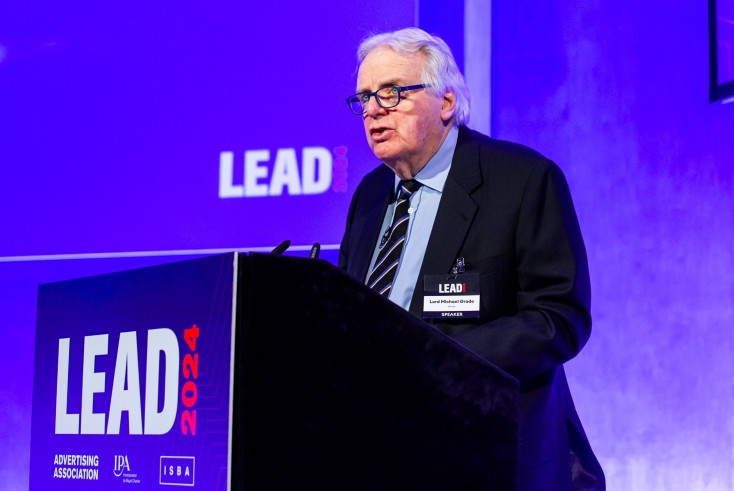50 shades of Grade: Why media will keep whipping itself over online harms

Opinion
The industry is very good at beating itself up over online harms, especially after Lord Grade’s speech at LEAD, but there are many obstacles to real change.
I’d describe this year’s big theme as self-flagellation.
It’s been a distant rumble for a long time, but it was brought into sharp focus by Ofcom chair Lord Michael Grade at this year’s Advertising Association gathering LEAD.
Born into one of the UK’s entertainment dynasties, with extensive senior commercial and public-service broadcasting experience and connections, there are surely few better-qualified to lead Ofcom through the many complexities of the day.
So when he exhorted the industry, notably advertisers, to take online safety more seriously — ie. curb spending in hostile environments displaying hate, discrimination and fake news — one would expect it to have some impact.
Safety is certainly one of several serious challenges we face. There’s much wrong with the ecosystem, so it’s good we’re finally beating ourselves up about it. But is it the right people doing it? Or are the real perps just quietly getting on with their hugely profitable businesses?
Grade’s words got some welcome column inches, not least in the “legacy” media that give this issue prominence for both editorial and commercial reasons.
First, the social issues of self-esteem, self-harm and the rise of hate, suicides and murders attributable to or facilitated by online stimuli are real and serious human stories. As is the rise of algorithms that focus, channel and amplify. BBC Radio 4’s Vortex series featured these concerns recently. Secondly, these “legacy” media have been losing revenues to online platforms for years.
Gordon Brown: Media and advertising play a key role in addressing poverty
Ongoing concerns
Going wider, former IPA director-general Hamish Pringle shared an interesting commentary. The clue’s in the name: enshittifcation.
Rob Norman, latterly a senior leader at WPP, and Mark Palmer of Maverick Planet shared another worrying development in the privacy and advertising data abuse space. What happens in the US so often comes to us.
Dr Augustine Fou reliably posts frequently on the many shortcomings of the online (and online advertising) ecosystems.
Fellow columnist Nick Manning promises research that will help advertisers sidestep hostile and inappropriate environments.
The various scraps between the platforms, TV carriers and streamers remind us that they don’t have the end-consumer in mind, let alone at heart. It’s not enough to own their data; they have to be corralled too.
This month, the EU fined Apple €1.8bn for suppressing competition from music streaming rivals. Apple is, of course, appealing and will continue to do so until all possible resources run out.
What will change?
While many will doubtless signal much virtue and garner coverage for self-flagellating, will it make much difference? The obstacles to progress are many…
- The US way of doing things is to proceed until challenged, admit to nothing until proven, then litigate and appeal iteratively.
- The major platforms have become rich beyond imagination on the profits of not taking responsibility. They have very deep pockets and are massively resourced, especially in lobbying and corporate affairs. (As an aside, a previous UK deputy prime minister leads “global affairs” for Meta.)
- The issues can be obscured by myriad details and changes both in pursuit of competitive advantage and in the wake of regulatory intervention (eg. deprecation of cookies or investment in content oversight). As with the Apple case above, there are some encouraging signals from competition regulators but, like the law, they move glacially.
- Any steps taken, however well-intentioned, will be at best half-baked or half-hearted, and less effective for it.
- Calls for reform or clean-up will likely continue to come mainly from legacy and/or public-service media. Second-tier online players might agree, but will see no commercial mileage in implementing something that will put them at yet further disadvantage to the top-tier players, which will likely seek to acquire and absorb the best of them anyway.
- Most advertisers will continue to be in denial that it is one for them and one that their spend fuels. Committing to tackling the issues is just too damn inconvenient and too much hard work — and someone else’s problem in a world of narrowly focused KPIs and sinister colleague performance-monitoring systems.
- Agencies — especially the publicly quoted networks — will continue to do what they consider necessary to protect profits absent viable remuneration from clients. That doesn’t involve adding the complexity of mandatory screening for taste and decency and morality — or even good provenance.
Despite the occasional brief flare-ups over these and other issues, everything quietly settles back down and the advertiser and agency spend patterns that fund it all resume.
All this said, perhaps some efforts will at least bear some fruit. And everything being relative, self-flagellation is a better look for an industry whose standing has seldom been tip-top and has deservedly suffered at its own hands of late.
 Bob Wootton spent 40 years working in advertising, first as a media buyer at some of the UK’s leading agencies before joining the trade body ISBA in 1996, where he was advertising and media director for 20 years. He is also the founder of Deconstruction, a media and tech consulting business, and presents The Guitar Show on YouTube.
Bob Wootton spent 40 years working in advertising, first as a media buyer at some of the UK’s leading agencies before joining the trade body ISBA in 1996, where he was advertising and media director for 20 years. He is also the founder of Deconstruction, a media and tech consulting business, and presents The Guitar Show on YouTube.
Podcast: Gordon Brown at LEAD 2024 — Reactions from ad industry




